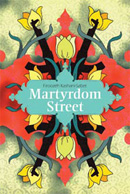

Syracuse Univ. Press, paperback, 9780815609759
Martyrdom Street is the first foray into fiction for Firoozeh Kashani-Sabet. Born and raised in Iran, she has been an outspoken advocate of political and cultural change in her home country, and is the author of several works of non-fiction about Iran.
Martyrdom Street follows the lives of three women during the aftermath of the 1979 revolution that saw Iran become an Islamic state. The first is Fatemeh, a women whose family has been torn apart by the effects of the revolution. Her husband has become an opium addict, and has married a much younger second wife. The second is Nasrin, Fatemeh's daughter, who has moved to New York to study and to escape the hardships of everyday life for women in Iran. The third is Yasaman, who lives with Nasrin. She has embraced her new western lifestyle much more wholeheartedly than has her flatmate, and is suffering from some of the excesses of New York living that Nasrin has avoided. Much of the book concerns a visit by Fatemeh to New York, and the contrasts in how the three women perceive life in the alien city.
Kashani-Sabet's book feels deeply personal, and I got the impression that I was actually reading about three facets of her own experiences as an Émigré Iranian woman in the US. Each character illustrates a different aspect of rejection or acceptance of the freedoms offered by their adopted city. The narrative is largely concerned with love and sex, whether it be Fatemeh's observation of her failing marriage, or the forces compelling the two younger women to choose husbands and lovers from both inside and outside the Iranian expat community in New York. In this respect, Martyrdom Street covers some fairly well-trodden ground.
Kashani-Sabet uses the device of having the three women narrate their own stories. I have always felt that using alternating narrators is difficult to perfect, and I tend to find myself picking my favourite voice and becoming bored by the others. This was unfortunately true of Martyrdom Street. Fatemeh's story held my attention, but the book would have lost nothing for me if Yasaman had been completely absent. At just 130 pages, it was ambitious to squeeze in three (albeit overlapping) stories, and it doesn't always work. The book relies heavily on the reader caring about the characters, but it doesn't allow enough time to get involved with them.
That being said, Martyrdom Street is otherwise a well written short novel, and a deeply
personal exploration of Iranian identity. Fatemeh's story kept me reading, and her relationship
with Nasrin held moments of both tenderness and tension that were genuinely moving. Kashani-Sabet's
first attempt at fiction contained enough good moments and
enough promise to point the way for even better things to come in the future.
